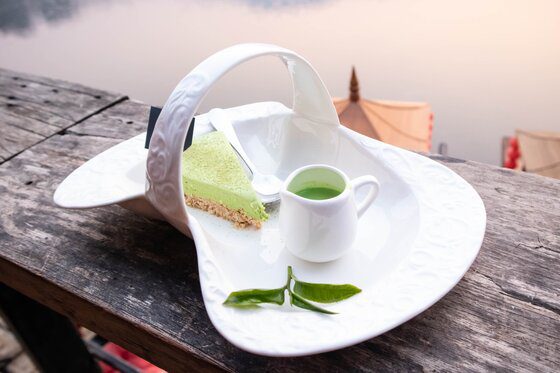If you have seen any Japanese anime or visited a cafe lately, you must have seen a frothy green drink being served, that drink is nothing but Matcha Tea. A variant of the traditional tea – Matcha Tea never fails to delight the taste buds with its exquisite taste. Matcha green tea powder is so popular that it is not limited to the boundaries of a teacup anymore. From ice cream to baked products, Matcha green tea has gained a strong foothold in everyone’s heart. So what’s the secret behind this popularity? Keep reading, and we’ll tell you everything you need to know about Matcha Tea.
What is Matcha Green Tea?
Mostly popular in Japan, Matcha tea has broken all geographical barriers. Though Matcha Tea comes from the same plant Camellia Sinensis, it is different from the other variants. The reason behind this difference is the process of its production.
Matcha tea is a type of Green Tea produced by following a specific set of procedures. It’s shaded before the harvest by shading the shrubs from sunlight. As a result, the growth rate becomes slower, and the level of chlorophyll in the leaves increases. This is the reason why Matcha has a darker green colour than regular green tea. For Matcha Tea, only the smaller and top buds are hand-plucked instead of the whole plant. The plucked leaves are left to dry and after that deveined and destemmed. Then, it’s slowly grounded with stone to ensure the leaves don’t lose their aroma due to the fiction produced from the grinding. The result is a talcum-like powder of emerald green colour. This is why Matcha Green Tea is so exquisite.
In the future, the Matcha powder is packed in tight containers to avoid any oxidation, resulting in the colour’s browning. Not only is the exquisite Matcha Tea prepared differently, but the method of its consumption is also different. Unlike other teas, where the tea leaves are steeped while brewing, the Matcha green tea powder is directly mixed with the water or milk. Many also like to whisk the tea in a zig-zag motion with a bamboo whisk. The result is a frothy green drink.
History of Matcha Green Tea
The name Matcha tea comes from two words: the Japanese word ‘Ma’ meaning ground or rubbed and ‘cha’ meaning tea. The Chinese Zen monks have been drinking Matcha tea for over 900 years.
Gradually, it reached the Japanese mainlands in the 11th century and has been a significant part of their culture ever since. The traditional way of preparing Matcha green tea Powder requires various customary tools. It is a slow step-by-step process and is regarded as a meditative ritual. Due to the increasing trend of an organic lifestyle, Matcha Green Tea has regained its popularity in China and other parts of the world.
Is drinking Matcha Green Tea Good for you? What are the Health Benefits of Matcha Tea Powder?
Yes, drinking Matcha Tea regularly is a very healthy practice. As the leaves are harvested by shedding the leaves, the nutrients’ content is higher than in other types of tea. Also, unlike other tea, where the leaves are discarded after brewing, in Matcha tea, the whole leaves are consumed in the form of Matcha green tea powder. Thus, we get the benefits in a fuller way. Also, it doesn’t lose any nutrients during the preparation as it is grounded into Matcha green tea powder instead of being processed by machines.
Here are some other health benefits of the Matcha powder:
• Matcha tea has a high amount of Epigallocatechin gallate. It is a kind of antioxidant that prevents diseases like cancer.
• It helps in weight loss.
• Matcha green tea powder reduces the risk of Type-2 diabetes.
• Studies claim Matcha green tea Powder helps in reducing LDL cholesterol and blood pressure.
• Drinking Matcha Tea reduces anxiety and dementia. Matcha tea considerably controls liver damage.
• It helps improve concentration and memory.
• Matcha tea has more caffeine than other teas, so it improves the body’s energy level. Also, the presence of L-Theanine reduces the ill effects of caffeine.
• It prevents the body from cardiovascular diseases.
• In terms of nutritional value, a cup of Matcha Tea is equivalent to 10 cups of regular green tea.
When Should I Drink Matcha Green Tea?
Though it’s subjective, there are a few particular moments when You can drink Matcha tea to reap maximum benefits. They are –
• Before exercising.
• Before starting to work.
• During the afternoon break.
Also, we would suggest you avoid Matcha Tea:
• Early in the morning.
• On an empty stomach.
• Before sleep.
How Much Matcha Green Tea Should I Drink Every Day?
Anything should be done in moderation no matter how good it is. Though, you can have up to 5 cups of Matcha Tea in a single day. It is recommended not to have more than 1 to 2 cups in a single day. 1 – 2 cups are enough to enrich your body with all the nutrients.
How to Prepare Matcha Green Tea?
Matcha green tea can be prepared both in a teacup or a tea bowl using the Matcha Green Tea Powder. Let us look at the steps for each of the recipes.
Matcha tea in a teacup –
• Step 1: Put the water to a boil. Use filtered water for better taste.
• Step 2: Put some Matcha green tea powder in the cup and pour a few drops of water.
• Step 3: Mix the Matcha powder until it becomes a paste.
• Step 4: Add more water to the paste and stir nicely.
• Step 5: The Matcha Tea is ready to serve.
Matcha Tea in a Tea Bowl –
• Step 1: Using a sifter, sift some Matcha Green Tea Powder into the bowl.
• Step 2: Add the boiled water into it.
• Step 3: Use a whisker to whisk it vigorously. Traditionally, bamboo whiskers are used to prepare it.
• Step 4: After the drink becomes frothy, it is ready to serve. You can use Teacurrymatcha green tea for both recipes.
Does Matcha Green Tea Help in Weight Loss?
Matcha Tea has magical effects on weight loss programs. It’s because –
• The EGCG catechin present in the Matcha Tea is a fat blocker. As a result, it increases the metabolism rate and reduces the growth of fatty cells in the body.
• The caffeine content in the best Matcha tea is more than all other types. This helps in reducing the Body Mass Index or B.M.I. and body weight.
Both these points have been proved by two studies published in The American Journal of Clinical Nutrition.
What are the Side Effects of Matcha Green Tea?
Though the best Matcha tea is considered a natural wonder for its health benefits, it is best to maintain moderation and avoid complications that may arise due to overconsumption. Here are some of the possible side effects of Matcha Green Tea –
• Matcha tea can cause stomach problems like indigestion and diarrhoea.
• It may lead to allergies in pregnant women.
• As it contains an increased amount of caffeine, it may cause sleep-related problems like insomnia.
• Having too much Matcha TeaTea may cause heartburn and dehydration.
These side effects may vary from person to person. Also, they can be avoided with moderate usage of Matcha tea. Judging by its popularity and surging popularity as a healthy organic drink, Matcha tea can be termed a gem of a drink. It is a better choice than coffee because of the presence of theanine. And thus, it can be a good alternative for people who don’t prefer coffee. Matcha Tea is also more nutritious than coffee and other forms of tea.

